
Adventures in Slumberland
I'm not really up on anime as much as I probably should be, and that is why I've never seen Perfect Blue, Millennium Actress, or the other films that comprise Kon Satoshi's body of work. Having now seen Paprika, his fifth project as director, I'm prepared to admit that this was inexcusably short-sighted of me.
Let's reach into the Film Critic's Cliché Grab-Bag and see what fits Paprika: "Visionary," yeah, and "Exhilarating" and "Alienating," okay...no, the last one's no good. Back into the grab-bag: "Generous." Well, not really, but whatever.
Of course, there isn't really a Cliché Grab-Bag. It's just a frippery I'm using to illustrate that idea that Paprika fills me with such overwhelming enthusiasm as to leave me gibbering. You know that experience you used to have when you were a wee child, where going to the movies was really fucking exciting, and no matter what you saw there, you were in awe of it? And you know how you don't really feel that way as an adult, but sometimes you stumble across something that makes you feel that old-fashioned enthusiasm that you always worry that you'll never ever feel again? Paprika did that for me. I cannot, of course, predict whether it will do the same for anyone else. God knows I hope it will.
Here's a most intriguing paradox: I can't imagine how anyone could leave this film raving about the story instead of the extraordinary visuals, and yet those visuals are enabled only because of the specific and rather involved details of said story. In a place that looks like it's probably Tokyo in the near future, a team of scientists has created the "DC Mini," a headpiece that permits users to share dreams. But we don't learn that immediately; first we're thoroughly confused by a prologue in which Detective Kogawa Tashimi (voiced by Ôtsuka Akio) is menaced by transvestite circus folk, who force him into a chain of stereotypical scenes from film genres, where he is eventually joined by Paprika (Hayashibara Megumi), a teenage girl with bright red hair who pulls him from his nightmare. Paprika is the alter-ego of Atsuko Chiba, a member of the DC Mini dev team who illicitly uses the device to explore its therapeutic potential.
Without getting too much into it, the plot concerns three stolen DC Minis, and a scheme to control the world by trapping all of humanity in their dreams, and if you guessed that this permits Kon and his animators to create some of the god-damnedest hallucinatory imagery in contemporary animation, you guessed correctly. Now, I'm the first to admit that I don't really know where this film fits into Kon's overall career, so for all I can tell, this is his mundane film, an arch bid for realism. I don't care. From my blinkered perspective, this is heady stuff, a series of increasingly surrealist visions (which no, I will not be sharing here, go see the damn movie) that follow each other without any needless rationality behind them, other than the rigid formalism of a dream. This is a perfect example of the sort of film that you're just supposed to let wash over you, and figure out what it was all about later.
While I'm not interested in making absolute statements about a film that is almost entirely sensory & therefore completely subjective, here is what I think is the case: Paprika is a critical attack on cinema and passive moviegoing. Many of the film's repeated motifs, particularly in the beginning and the end, take the cues from from the most trite genre films imaginable (including a couple of elliptical potshots at Disney), and Detective Kogawa suffers from a weird fear of the movies that will ultimately find its explanation in an indictment of action movie boilerplate. In other words: Kon is annoyed by the lack of originality in modern filmmaking, and so he makes a film that pokes fun at movie clichés. This theme could only possibly work in a film that itself broke free of typical moviedom, which Paprika most certainly does; it reminds me of nothing else I've seen, except in the most superficial ways.
There's a special kind of perversity in opening a film like Paprika during the heart of Summer Movie Season. Of course, nobody would drift into this film by accident, seeing that Spider-Pirates: Rise of the Transformers was sold out, but it's fun to imagine the dull-eyed consumer of Hollywood product looking for a couple hours in the cool dark, stumbling upon an exploration of the ways in which that very tendency has basically corrupted our species' ability to dream. That's a mean-spirited and somewhat inaccurate thing to say, but it's not hard to argue that most movies are not designed to make us think, they are in fact specifically designed to make us not-think, and if it is truly Kon Satoshi's desire to point at that and say, "that is wrong," then I will stand up and cheer for the man.
As for the fever-dream visuals, well, you can't write about that sort of thing. You can only see it with your own eyes. They are not the most outlandish images ever put to film, even I know enough anime to recognize that, but they are precisely as outlandish and wonderful as this film needs them to be, and that fact makes them an absolute good.
Let's reach into the Film Critic's Cliché Grab-Bag and see what fits Paprika: "Visionary," yeah, and "Exhilarating" and "Alienating," okay...no, the last one's no good. Back into the grab-bag: "Generous." Well, not really, but whatever.
Of course, there isn't really a Cliché Grab-Bag. It's just a frippery I'm using to illustrate that idea that Paprika fills me with such overwhelming enthusiasm as to leave me gibbering. You know that experience you used to have when you were a wee child, where going to the movies was really fucking exciting, and no matter what you saw there, you were in awe of it? And you know how you don't really feel that way as an adult, but sometimes you stumble across something that makes you feel that old-fashioned enthusiasm that you always worry that you'll never ever feel again? Paprika did that for me. I cannot, of course, predict whether it will do the same for anyone else. God knows I hope it will.
Here's a most intriguing paradox: I can't imagine how anyone could leave this film raving about the story instead of the extraordinary visuals, and yet those visuals are enabled only because of the specific and rather involved details of said story. In a place that looks like it's probably Tokyo in the near future, a team of scientists has created the "DC Mini," a headpiece that permits users to share dreams. But we don't learn that immediately; first we're thoroughly confused by a prologue in which Detective Kogawa Tashimi (voiced by Ôtsuka Akio) is menaced by transvestite circus folk, who force him into a chain of stereotypical scenes from film genres, where he is eventually joined by Paprika (Hayashibara Megumi), a teenage girl with bright red hair who pulls him from his nightmare. Paprika is the alter-ego of Atsuko Chiba, a member of the DC Mini dev team who illicitly uses the device to explore its therapeutic potential.
Without getting too much into it, the plot concerns three stolen DC Minis, and a scheme to control the world by trapping all of humanity in their dreams, and if you guessed that this permits Kon and his animators to create some of the god-damnedest hallucinatory imagery in contemporary animation, you guessed correctly. Now, I'm the first to admit that I don't really know where this film fits into Kon's overall career, so for all I can tell, this is his mundane film, an arch bid for realism. I don't care. From my blinkered perspective, this is heady stuff, a series of increasingly surrealist visions (which no, I will not be sharing here, go see the damn movie) that follow each other without any needless rationality behind them, other than the rigid formalism of a dream. This is a perfect example of the sort of film that you're just supposed to let wash over you, and figure out what it was all about later.
While I'm not interested in making absolute statements about a film that is almost entirely sensory & therefore completely subjective, here is what I think is the case: Paprika is a critical attack on cinema and passive moviegoing. Many of the film's repeated motifs, particularly in the beginning and the end, take the cues from from the most trite genre films imaginable (including a couple of elliptical potshots at Disney), and Detective Kogawa suffers from a weird fear of the movies that will ultimately find its explanation in an indictment of action movie boilerplate. In other words: Kon is annoyed by the lack of originality in modern filmmaking, and so he makes a film that pokes fun at movie clichés. This theme could only possibly work in a film that itself broke free of typical moviedom, which Paprika most certainly does; it reminds me of nothing else I've seen, except in the most superficial ways.
There's a special kind of perversity in opening a film like Paprika during the heart of Summer Movie Season. Of course, nobody would drift into this film by accident, seeing that Spider-Pirates: Rise of the Transformers was sold out, but it's fun to imagine the dull-eyed consumer of Hollywood product looking for a couple hours in the cool dark, stumbling upon an exploration of the ways in which that very tendency has basically corrupted our species' ability to dream. That's a mean-spirited and somewhat inaccurate thing to say, but it's not hard to argue that most movies are not designed to make us think, they are in fact specifically designed to make us not-think, and if it is truly Kon Satoshi's desire to point at that and say, "that is wrong," then I will stand up and cheer for the man.
As for the fever-dream visuals, well, you can't write about that sort of thing. You can only see it with your own eyes. They are not the most outlandish images ever put to film, even I know enough anime to recognize that, but they are precisely as outlandish and wonderful as this film needs them to be, and that fact makes them an absolute good.
Categories: animation, fantasy, japanese cinema, kon satoshi, science fiction






